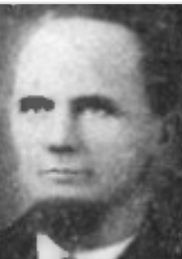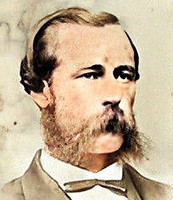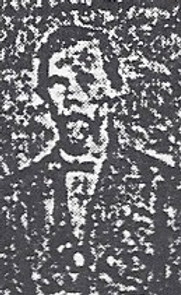Q -R
Elijah Hupton

An immigrant from Texas, USA with the "New Texas" group, Sailed on the ill-fated Derby. Parson to the colonists.
"O. H. Quillen, his wife, and five children went to Brazil with McMullan. After the breakup of the colony, the Quillens apparently settled in the western part of the grant along the Piexe and Guanihara rivers. There "Parson" Quillen, educated as a school-teacher, conducted religious services which "acted as a centripetal force which periodically drew the American colonists together." The Quillens remained on the frontier until the 1870s. After the departure of their only remaining neighbors, the Alfred Smiths, they moved to Santa Barbara. One of Quillen's sons became a dentist; another, according to Barnsley, "is in the Sertao [the inland part of the country] , the less said the better."
SOURCE: Griggs Thesis
See Quillin Family Page
QUILLEY
No further information yet,
RADER
No further information yet,
RAIDIG
No further information yet,
RAINEY,
Thomas,
Dabney


Rainey Brothers
Thomas and Dabney
Thomas Rainey was born 9 December 1824 in Yanceyville, Caswell County, North Carolina, one of the many children of James Glenn Rainey and Sophia Hendrick Rainey. Apparently schooled in engineering and eventually becoming Dr. Thomas Rainey, he led a colorful life. Rainey taught school, wrote a book, became involved in Republican party politics, and studied steam navigation in Europe. At one time he owned a fleet of sixteen steam ferry boats in Brazil, and his brother Dabney Rainey is buried there. His fortune was made in Brazil, but it was a bridge that became his life's passion.
Dabney Rainey (1835-1870) of North Carolina settled in Brazil before the Civil War, helping with his brother Thomas Rainey's transportation business. After the war ended, he found himself in the vanguard of an influx of Confederate refugees--Os Confederados--looking to start over in a nation which still practiced slavery. In a letter he expresses his frustration with some of the newcomers: "We have had a great many southern men here looking for homes, but very few of them are satisfied, and very nearly all have gone home or to some other country. . . . One of them has settled here. His hatred of the U.S. has induced him to do so. He says if he were bound for Hell from here, and had three weeks furlough in the U.S. that he would not stop, but go on to hell. God only knows what is to become of many of the poor devils which have come here." Discussing local conditions, he notes that "Brazilian money is very much depreciated on account of the Paraguayan War. The Paraguayans have been threshing them like Old Nick lately, and I would not care a tinker's --- if they were to kill the whole race."
Their sister, Jennie Samuel Rainey, would become the wife of George Presley Keyes of Montgomery, Alabama, the brother of Confederado - Dr. John Washington Keyes.
See Rainey family page.
RALSTON
No further information yet,
Rev. John James

John James Ransom was born in 1853 in Rutherford County, Tennessee
The Reverend John J. Ransom disembarked in Rio de Janeiro in 1876. At first, Ransom stayed in Campinas, not far from Newman, but after learning some Portuguese and scouting out several areas in Brazil in search of the best place to initiate Methodist work, Ransom settled in Rio de Janeiro where he began holding preaching services in English and in Portuguese. In 1878, he organized the first Methodist church in the capital city with six English-speaking members. He started a Sunday School that was attended by approximately fifty people, and the next year, in March 1879, Ransom received the first Brazilians into membership in the Methodist Church in Brazil.
On Christmas Day, 1879, Ransom married Annie Ayres Newman, daughter of Reverend Junius E. Newman,, but she soon died. In 1880 Ransom returned to the United States where he spent a year recovering from his wife's death and awakening interest in the Brazilian mission.
See Ransom family page
RAST
No further information yet,
Parson Richard

Parson Richard Ratcliff, an immigrant from Texas, USA, A member of the "New Texas" group, Sailed on the ill-fated Derby. He sailed with his wife and family along with his brother-in-law and family (Kennerly). A preacher of great esteem considered the "Chaplain of the the fledgling colonoy.
", . After the death of Frank McMullan, Ratcliff, whose first name has not been located, and his wife, accompanied by J. Weingarten (another McMullan colonist) and his daughter, went to Santa Barbara where a daughter was born to the couple...."
SOURCE: Griggs Thesis
The Times-Argus, 20 Oct. 1869, Wed. Page 1
....
Rev. R. Ratcliff, of Louisiana, came to Brazil, in May 1867. He bought 80 acres of land, with no improvements. He has cleared 21 acres, planted 4 acres in cotton and 17 in corn; his cotton will make nearly a bale to the acre, was on new land, and cultivated entirely with the hoe. Mr. R. has built himself a house and made some other improvements, working entirely by himself, with the exception of $34 pout for help during the year....
See Ratcliff family page
REAN,
T.O.
Settled in Santarem, No further information yet, Source LOP


Romulus John Rhome was born in New York to Peter and Nancy Rhome. In 1855 the family moved to Cherokee County, Texas, and in 1857 Romulus married Missouri Robertson. In 1861 Romulus enlisted in the 1st Texas Infantry in the Confederate army and served in Hood’s brigade. Romulus fought in the First Battle of Manassas, but his health began to fail, and he was mustered out of the army.
When the war ended, for Romulus John Rhome the South was not south enough. In 1866 Romulus Rhome, his family, and possibly some former slaves moved to Santarem, Brazil.
Romulus Rhome’s children, such as daughter Gita, were sent back to the States only for education. His wife, Missouri, died on the plantation in 1884. Romulus died there in 1892. One account says he was shot by rebels after the overthrow of Emperor Pedro II, who had offered U.S. citizens—especially farmers—subsidies and tax breaks to immigrate.
Romulus Rhome had a brother named not “Remus”
See Rhome family page
Family

In 1871 Robert Henry Riker (pictured below left, 1866) arrived in Santarem and bought land from the government of Pará. Riker, together with his brother Herbert, made the first rubber plantations in the Amazon. A curious detail is that decades later, the American industrialist Henry Ford tried to cultivate the plant in the same area, on the banks of the Tapajós river.
Robert Henry Riker was a railway entrepreneur in the United States and was in Fort Sumter, near the city of Charleston, South Carolina, when the first shot of the Southerners who started the Civil War was fired. Riker came to Brazil accompanied by his wife and 5 children (a nine-month-old baby died on the trip). For the aristocratic family, and a member of the high society of Charleston, living in a rustic area and where the neighbors were distant was undoubtedly difficult. The couple Riker still had a son here in Brazil, baptized Marlin Amazonas. However, the boy was born with deficiencies and had to be supported by the other brothers until adult age.
Mrs. Sarah Riker (pictured below right) and her children made trips to visit their homeland. According to Odete Guilhon tells us, Mrs. Riker never got used to the change of country and lived sadly her years in Brazil, dying, still new, in 1877. Four years later, Robert H. Riker lost his eldest son, Robert, only 29 years old. The older daughter Lilla married Charles Vaughan from another immigrant family and returned to the United States. The other sister, Virginia, followed the same path. The patriarch Robert H. Riker passed away in 1883.
See Riker family page
RITTER
No further information yet,
William Nona
An engineer from Pennsylvania helping to build the railroad in Brazil, 1857
"William Nona Roberts is still the engineer who has been living in Cumberland, had determined a route for the Dom Pedro II railroad in 1857. His son later married Humbard’s daughter in a ceremony performed by Reverend Simonton. Roberts, a Presbyterian, and Simonton were both originally from Carlisle, Pennsylvania."
For the entire story No further information. Source: Janigan
See McCollum family page
ROUNGBLOOD
From South Carolina, settled in Coritiba
Immigration Scout from Louisiana, USA
"A fellow Louisianian named Roussell who was also scouting Brazil told him that Dr. Fletcher, Blue and such… ought “all to be put in a bag and all thrown into the sea for the lies about Brazil.”
For the entire story, No further information. Source: Janigan
See McCollum family page
ROUTH,
William F.
Sailed on "Margurite" out of Mobile in 1866. Part of the Hastings group
No further information yet,
ROWE,
John Henry
Immigrant from Alabama, USA
Military:
John Henry Rowe: was born on Feb 22, 1846, USA, and died on Dec. 16, 1922. He married to Sarah L?. He was a resident of Tuscaloosa County, Alabama when the War began. He enlisted as a private in Company F of the 50th Alabama Infantry in March of 1862 and fought at the Battle of Shiloh, Tennessee. The 50th Alabama Infantry was originally named Coltart's 26th Alabama Infantry but was renamed the 50th in June 1863. Colonel John C. Coltart commanded it. The 50th also fought at Murfreesboro, Chickamauga, Atlanta, and Franklin. The regiment surrendered in April 1865 in North Carolina. John Henry Rowe was captured during the war in the Battle of Resaca, Georgia. In 1864 he was taken to Camp Douglas P.O.W Camp at Chicago, Illinois. He was kept there until March 15, 1865, when he was sent to Point Lookout, Maryland, where he was exchanged on April 12, 1865.
See Rowe family page
ROWLAND,
Immigrant from Mississippi, USA,
The Weekly Iberville South, Nov. 23, 1867
....Mr. Rowland of Franklin Co., Miss. bought 6,000 acres, 69 slaves, horses, stock, all the crops of coffee and sugar of this year, part already gathered and on land. $50, 000, part cash, balance on time. He paid $1,000 and is to pay $15,000 more in four months, and expects the crops will meet it, though he has money in the U.S to do so....
No futher information yet
RUSSELL
Simeon
